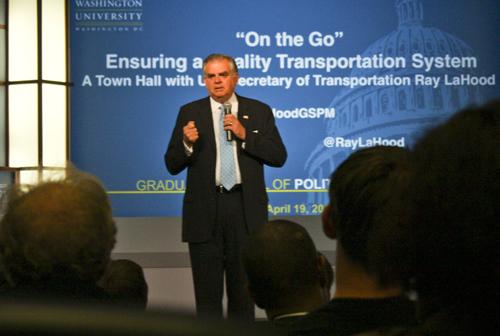
This post was written by Hatchet Reporter Samantha Abramowitz.
The U.S. Secretary of Transportation emphasized the importance of bipartisanship – pointing to his work as one of only two Republicans in President Barack Obama’s cabinet – Thursday at Jack Morton Auditorium.
Ray LaHood, who has advocated for safe driving and transportation projects, said forging compromises in Congress hinges on flexibility.
“In this business that I’m in, public service, not dissimilar to other businesses, is about relationships, building relationships, and building opportunities to get things done,” LaHood said.
LaHood, 66, said despite the need for projects like high-speed rails, the future of the country’s transportation system does not have a distinct vision because of election-year politics.
“Republicans don’t want to hand Obama a jobs bill right before the election and there won’t be a transportation bill right before the election,” he said.
A former congressman from Illinois, LaHood was approached by Obama to become a part of his cabinet in 2008. He announced in October that he would step down from the cabinet in 2013.
He said the lack of federally funded roadwork and transportation innovation hurts contractors and worker, but projected that Congress could make progress after the election.
“People like mass transit,” LaHood said. “We want more walking and biking paths, light rails and street cars in order to give people options in transportation. People will always drive cars, but if there are other options people will use them.”
Obama and LaHood have supported the construction of high-speed rails across the United States, similar to the systems that exist in Europe. LaHood said getting state governors on board with the project would be key to its success.
He added that these projects will likely take two to three decades to complete.
LaHood also addressed the “epidemic” of distracted driving, stressing the dangers of texting or talking on the phone while driving.
“A car travels the length of a football field in four seconds, time in which people need to pay attention,” he said. “There is no message or phone call that’s too important and can’t wait for destination.”




